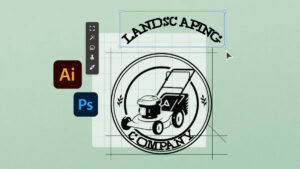Hello there! My name is Justin Reid, the Content Manager for Landscape Branding Co. (LBC). Over the years, I’ve seen a lot of landscaping businesses come and go. The difference between success and failure often boils down to one critical factor: marketing. The best landscaping skills in the world won’t help your business if customers can’t find you.
The landscaping industry is as competitive as ever. It’s vital for small businesses to carve out a niche, communicate their unique value, and reach the right customers. That’s where an effective landscape marketing campaign comes in.
Table of Contents
In this blog post, I’ll share the secrets I’ve learned about marketing for landscaping companies. From identifying your target audience and branding a company to leveraging traditional and digital marketing strategies, I’ll guide you through the steps on putting together marketing campaigns, increase your brand awareness, and attract more local customers.

Understanding the Landscape of Landscape Marketing🤪
Market Research and Analysis
Before you can effectively market your landscaping business, you need to understand the landscape (no pun intended) of your industry. This involves more than just knowing your services inside out or being aware of your immediate competitors. It’s about comprehending the broader context in which your business operates.
Identifying Target Audience and Their Needs
Who are your ideal customers? Residential clients looking for lawn maintenance? Commercial accounts needing regular landscaping services? Identifying your target audience and their consumer behavior is the first step in any marketing strategy.
Once you have a clear idea of who your customers are, you can tailor your services and marketing efforts to meet their specific needs. For instance, if your target audience is homeowners in a particular locality, your marketing materials should highlight your expertise in local plant species and environmentally-friendly landscaping techniques.
Analyzing Competitors and Industry Trends
It’s also important to keep an eye on your competition. What services do they offer? How do they market themselves? What can you do differently or better?
Industry trends can also offer valuable insights. Are there new landscaping techniques or equipment that you should be aware of? Are customers’ preferences changing in any way? Staying on top of these trends can help your landscaping business stay relevant and competitive.
Developing a Unique Value Proposition
Your Unique Value Proposition (UVP) is what sets you apart from your competitors. This is a key concept when creating a brand identity. It’s the reason why customers should choose your landscaping services over others. The following information is the same for when we are branding a landscaping company that is just starting out or is revamping their image.
Identifying Key Differentiators
Maybe you have decades of experience in the industry, or perhaps you specialize in sustainable landscaping practices. Whatever your strengths are, make sure your potential customers know about them.
Creating a Compelling Brand Story
Your brand story is more than just the history of your landscaping business. It’s the values you stand for, the problems you solve, and the reasons why you do what you do. A compelling brand story can resonate with your customers on an emotional level and foster loyalty.
In the next section, we’ll delve into the secrets to successful landscape marketing, from building an engaging website to leveraging social media for maximum impact. Stay tuned!

Secrets to Successful Landscape Marketing
Building an Engaging Website
In today’s digital age, your website often serves as the first point of contact between your landscaping business and potential customers. Thus, it’s crucial to create a website that is not only visually appealing but also user-friendly and informative.
User-Friendly Design and Navigation
Your website should reflect the quality of your landscaping services. A professional, well-designed website can significantly enhance your brand’s image and credibility. It should be easy to navigate, with clear menus and categories, quick load times, and a responsive design that looks great on both desktop and mobile devices.
If you’re not a tech-savvy business owner, don’t worry. At LBC, we offer custom web design services specifically tailored for lawn care and landscaping businesses.
Showcasing Past Projects and Portfolio
Potential customers will want to see examples of your work. Include a portfolio section on your website where you showcase your past projects. High-quality photos and descriptions of each project can help visitors visualize what you could do for their own homes or businesses.
Incorporating Testimonials and Customer Reviews
Online reviews and testimonials are incredibly influential in a customer’s decision-making process. Incorporate a section for customer reviews on your website to showcase your authority and expertise in the landscaping industry. Respond to both positive and negative reviews in a professional manner to show that you value customer feedback and are committed to improving your services.
Remember, your website is not just a digital brochure for your landscaping business. It’s a powerful marketing tool that, if utilized correctly, can help you attract and retain more local customers.
Leverage Digital Marketing
In the modern world, the power of digital marketing cannot be overstated. It’s an essential tool for reaching a broader audience and promoting your landscaping business more effectively.
Online Marketing
Online marketing and digital marketing are often used interchangeably, but they have slight differences in their scope.
Online marketing refers to the promotion of products, services, or brands using various online channels such as websites, search engines, social media platforms, email, and online advertising. It primarily focuses on marketing activities that occur specifically online.
On the other hand, digital marketing encompasses a broader range of marketing activities that utilize digital technologies, including online marketing. Digital marketing includes both online and offline channels such as mobile devices, electronic billboards, display advertising, podcasts, and other digital media. It encompasses all forms of marketing that involve electronic devices and technology.
While online marketing is a subset of digital marketing and specifically refers to marketing activities conducted online, digital marketing encompasses a wider range of marketing activities, including both online and offline channels.
The Role of Websites, SEO, and Online Advertising in Landscape Marketing
Your website is the cornerstone of your digital marketing efforts. However, having a website isn’t enough – you need to ensure people can find it. This is where Search Engine Optimization (SEO) comes into play. SEO involves optimizing your website’s content and structure to make it more appealing to search engines, helping your site rank higher in search results for relevant keywords.
When potential customers search for “landscaping services” or “lawn care,” you want your business to be one of the first they see. To achieve this, you might need to delve into the world of online ads, such as Google Ads. Paid ads can help boost your visibility on search engines and social media platforms, allowing you to reach more potential customers.
How Social Media Can Be Used as a Marketing Tool
Social media platforms like Facebook, Instagram, and Twitter offer an unprecedented opportunity to engage with your customers directly. You can use these platforms to showcase your work, share landscaping tips and insights, run promotional campaigns, and even handle customer service inquiries.
Social media also enables you to target your advertising to a specific audience based on factors like location, age, interests, and more. This can be particularly useful for landscaping businesses that serve a local or regional customer base.
Remember, effective digital marketing is about more than just selling your services – it’s about building relationships with your customers, understanding their needs, and positioning your business as a trusted authority in the landscaping industry.
Offline Digital Marketing
Offline digital marketing may sound like a contradiction, but it’s about using digital resources and technology for marketing in the offline or physical world. For a landscaping company, there are several ways they might employ offline digital marketing strategies:
- Digital Signage: This involves the use of digital screens to display engaging content, such as before-and-after images of landscaping projects, services offered, testimonials from satisfied customers, etc. These can be placed in strategic locations like the company’s office, at client sites, or in public areas with high foot traffic.
- QR Codes: A landscaping company could use QR codes on their physical promotional materials like brochures, flyers, and business cards. When scanned with a smartphone, the QR code could lead to the company’s website, a portfolio of their work, or a promotional video. This is a great way to bridge the gap between offline and online marketing.
- Interactive Kiosks: These can be set up at trade shows, home and garden shows, or even in malls. They can provide interactive digital content about the company’s services, showcase projects, or even offer an interactive design tool where potential clients can create a rough vision of their dream landscape.
- Augmented Reality (AR): With advancements in AR, landscaping companies can offer clients an immersive experience where they can ‘see’ proposed landscaping designs overlaid on their actual property using a smartphone or tablet. This technology can be introduced to clients during in-person meetings, or at events, using specific AR-enabled applications.
These offline digital marketing strategies can complement the online marketing efforts of a landscaping company and help maximize its reach and visibility within the local community. Remember, the effectiveness of these strategies largely depends on the target market. Always consider the preferences and behaviors of your audience when deciding on the best digital offline marketing strategies for your landscaping business.
Utilize Local SEO
For landscaping businesses, one of the most effective ways to attract new clients is by optimizing for local SEO. This strategy helps businesses promote their services to local customers at the exact time they’re looking for them online.
Explanation of Local SEO and Its Importance
Local SEO involves optimizing your online presence to attract more business from relevant local searches on Google and other search engines. When someone in your area searches for ‘landscaping services,’ you want your business to appear in the top results, and that’s what local SEO is all about.
The importance of local Search Engine Optimization cannot be overstated. According to a study, 46% of all Google searches are looking for local information. Moreover, “near me” or “close by” type searches grew by more than 900% over two years. These statistics emphasize the significance of local SEO in attracting local customers to your landscaping business.
Steps to Optimize for Local SEO
Here are some steps to optimize your business for local SEO:
- Google My Business: Claim your Google My Business listing. This free tool allows you to promote your Business Profile and business website on Google Search and Maps. Fill in every relevant field in your profile, including business description, categories, and opening hours.
- Reviews: Encourage your customers to leave reviews. Respond to these reviews in a timely manner. This not only helps with local SEO but also builds trust with potential clients.
- Local Keywords: Incorporate local keywords into your website content and meta tags. These could include your city or region name, or terms like ‘near me.’
- Local Backlinks: Aim to get high-quality backlinks from other local businesses, directories, or organizations. These serve as a signal to search engines about the local relevance of your business.
- NAP Consistency: Ensure your business name, address, and phone number (NAP) are consistent across all your online platforms. This includes your website, social media profiles, and local directories.
Remember, local SEO is an ongoing process that requires regular monitoring and adjustments. However, the results in terms of increased local visibility can be well worth the effort.
Content Marketing
Content marketing is all about creating and sharing valuable content to attract and engage your audience, eventually turning them into customers. It’s an effective way to showcase your authority and expertise in the landscaping industry.
How to Use Content Marketing to Educate and Engage Potential Clients
Content marketing is not about direct selling; instead, it’s about creating content that educates, entertains, or inspires your audience, thereby building trust and relationships. This could be through blog posts, eBooks, infographics, videos, or even podcasts.
For example, you could write a blog post on “How to Prepare Your Garden for Spring,” or create a video tutorial on “DIY Landscaping Tips for Beginners.” This kind of content not only showcases your knowledge but also helps potential clients who are seeking this information.
Remember, consistency is key in content marketing. Regularly update your company blog with fresh, relevant content to keep your audience engaged and coming back for more.
Examples of Effective Content Marketing in the Landscape Industry
One great example of content marketing in the landscape industry is a landscaping business that regularly publishes blog posts on topics ranging from “30 Pretty Fall Flowers to Add Color to Your Autumn Garden” to “Best Grass To Choke Out Weed.” Not only do these posts provide valuable insights to their readers, but they also help to position the business as a thought leader in the industry.
Another example could be a lawn care company that creates engaging how-to videos on lawn maintenance. These videos can then be shared on their website, social media platforms, and even in email newsletters, providing value to their customers while subtly promoting their services.
With content marketing, creativity is your only limit. Think about what kind of information your audience would find helpful or interesting, and then find a way to deliver it in a format that they’ll enjoy.
Email Marketing
Despite the proliferation of social media and other digital marketing channels, email marketing remains an effective tool for customer retention and acquisition, especially for small businesses like landscaping companies. No wonder companies like Constant Contact and MailChimp are so popular.
The Power of Email Marketing for Customer Retention and Acquisition
Email marketing allows you to maintain direct communication with your customers and prospects. It’s personal, cost-effective, and when done right, can deliver a high return on investment (ROI). In fact, for every $1 spent on email marketing, the average return is $42, making it a highly effective marketing strategy for small businesses.
With email marketing, you can inform your customers about new services, seasonal promotions, or even provide them with valuable content like landscaping tips and advice. It’s also a great way to nurture leads and convert them into paying customers.
Remember, the key to successful email marketing is to ensure your emails are relevant and provide value to the recipient. This will increase open rates, engagement, and ultimately, conversions.
How to Create an Effective Email Marketing Campaign
Creating an effective email marketing campaign involves several steps:
- Build Your Email List: Start collecting emails from your customers and website visitors. Offer something of value in return for their email address, such as a free landscaping guide or a discount on their first service.
- Segment Your List: Not all customers are the same. Segment your email list based on criteria like location, service interest, or past purchases to send more targeted and relevant emails.
- Create Engaging Content: Write emails that are informative, helpful, and engaging. Use compelling subject lines to encourage opens.
- Include a Call-to-Action (CTA): Always include a clear CTA in your emails, directing recipients to take a desired action such as booking a service or reading a blog post.
- Test and Analyze: Use A/B testing to find out what works best for your audience. Analyze your results, learn from them, and adjust your strategy accordingly.
By leveraging email marketing, you can stay top of mind with your customers, nurture leads, and drive more business to your landscaping company.
Leveraging Social Media for Maximum Impact
In today’s digital age, social media has become a vital tool for businesses to connect with their audience, build brand awareness, and increase sales. This is no different for landscaping companies.
Choosing the Right Platforms for Landscaping Businesses
Not all social media platforms are created equal, and the platforms that are most effective for your landscaping business will depend on your target audience. Generally, visual platforms like Instagram and Pinterest are great for showcasing your work, while Facebook and Twitter are excellent for customer engagement and service updates.
It’s important to research and understand where your potential customers are most active, and then focus your efforts on those platforms. For instance, if your target audience consists of homeowners aged 30-50, Facebook might be a better platform than Snapchat or TikTok.
Utilizing Social Media Advertising and Influencer Partnerships
Social media isn’t just about organic reach; paid advertising can also be a powerful tool. Platforms like Facebook and Instagram offer targeted advertising options, allowing you to reach people in your local area who are likely to be interested in your services.
Influencer partnerships can also be highly effective. Working with local influencers who have a strong following in your area can help you reach potential customers that you may not have been able to reach on your own.
Regardless of the platforms or strategies you choose, remember that successful social media marketing is about engaging with your audience, not just promoting your services. People tend to not follow profiles that are only advertising. You see, people like to buy, but they don’t like being sold to. Be sure to respond to comments, share valuable content, and show the personality behind your brand.
Embrace Traditional Marketing Techniques
While digital marketing methods have become increasingly important, traditional marketing techniques still hold significant value, especially in industries like landscaping where local, tangible connections matter.
The Value of Vehicle Magnets, Uniforms, Business Cards, Mailers, and Other Forms of Direct Marketing
Direct marketing techniques such as vehicle magnets, uniforms, business cards, and mailers allow you to reach potential customers in your local community.
Vehicle magnets and branded uniforms can transform your company vehicles and staff into moving billboards, increasing your brand visibility wherever they go. Branded uniforms can also help instill a sense of trust and professionalism among customers, which can be especially beneficial in the landscaping industry.
Business cards are not just for networking events. They can be left with satisfied customers to pass onto their friends, or strategically placed in local businesses frequented by your target audience. In fact, a well-designed landscaping business card can make a strong impression and help your company stand out from the competition.
Mailers, such as flyers and postcards, can be an effective way to reach local customers, especially if they include a special offer or discount.
The Power of Word-of-Mouth and Referral Marketing
Word-of-mouth and referral marketing is another traditional marketing method that can be particularly effective for landscaping businesses. Happy customers are likely to recommend your services to their friends and family, which can lead to new business opportunities.
Consider creating a referral program to incentivize your current clients to spread the word about your landscaping services. The program could offer discounts or complimentary services for every new client they bring to your business.
How to Combine Traditional and Digital Marketing Strategies Effectively
The most effective marketing strategies often involve a mix of both traditional and digital techniques. For example, you could use social media to promote your referral program, or include your website and social media handles on your business cards and mailers to drive online traffic.
Remember, the goal is to reach potential customers wherever they are, whether that’s online, driving past your branded vehicle, or receiving a mailer at their home.

Case Studies of Successful Landscape Marketing
Over my tenure at Landscape Branding Co., I’ve had the privilege of working with numerous landscaping businesses, watching them grow and succeed. Let’s look at a couple of examples where these marketing secrets were put into practice effectively.
Case studies showing how these secrets have been used successfully by real-world companies.
- Case Study 1: Building a Brand with a Website and SEO
One of our clients, a small landscaping business, was struggling to get noticed in their local market. They had a wealth of expertise and a great team, but their lack of an online presence was hindering their growth. We helped them build a user-friendly website, showcasing their services and past projects. We also implemented SEO strategies to boost their visibility on search engine results.
Within a few months, they saw a significant increase in inquiries and new clients. The website was not just a marketing tool, but it established them as an authority in the landscaping business in their area. - Case Study 2: Leveraging Social Media and Customer Reviews
Another client of ours was a lawn care business that primarily relied on word-of-mouth referrals. They wanted to expand their reach but weren’t sure how. We suggested leveraging social media and encouraging their satisfied customers to leave reviews online.
They began sharing before-and-after photos of their lawn care projects on Instagram and Facebook. They also started a program to encourage their customers to leave reviews on their website and Google My Business page. This strategy not only increased their visibility but also built trust with potential customers.
These are just a couple of examples. Every landscaping business we work with is unique, and we tailor our marketing strategies to their specific needs and goals. When you apply these marketing secrets, I’m confident that you’ll see your own success stories unfold.

Common Mistakes to Avoid in Landscape Marketing
In my years at Landscape Branding Co., I’ve seen many landscaping businesses attempt to take on the world of marketing, but not all succeed. Here are some common mistakes I’ve observed and how you can avoid them:
Overview of common marketing pitfalls in the landscape industry.
One pitfall I’ve seen is a lack of understanding of the target market. Many businesses cast a wide net hoping to appeal to everyone. But, in my experience, the most successful marketing strategies are those tailored to a specific group of customers. Knowing your customer and understanding their needs is vital.
Another common error is neglecting online presence. In this digital age, having a professional and user-friendly website is no longer optional. It’s a critical tool for reaching local customers and showcasing your landscaping services. I’ve seen businesses transform their customer reach simply by updating their website and improving their SEO.
Tips on how to avoid these mistakes.
To avoid these pitfalls, my advice is to invest time in market research. Get to know your customers and what they want from a landscaping service. Use this information to guide your marketing efforts.
For your online presence, consider enlisting professional help if needed. At Landscape Branding Co., we offer web design services specifically tailored for landscaping businesses.
Remember, marketing is not a one-size-fits-all solution. Each business is unique and what works for one may not work for another. Avoid copying competitors and instead focus on what sets your business apart.

Tracking and Measuring Success
Just as a well-tended garden requires regular monitoring and care, so does your landscape marketing strategy. By setting key performance indicators (KPIs), utilizing marketing analytics tools, and evaluating return on investment (ROI), you can ensure your marketing efforts are fruitful.
Setting Key Performance Indicators (KPIs)
KPIs are measurable values that demonstrate how effectively a company is achieving key business objectives. For a landscaping business, KPIs might include the number of new leads generated, the conversion rate of leads to customers, website traffic, social media engagement, or customer retention rates.
It’s essential to set specific, measurable, achievable, relevant, and time-bound (SMART) KPIs for your landscape marketing efforts. For example, you might aim to increase website traffic by 20% over the next six months or to gain 50 new social media followers each month.
Utilizing Analytics Tools to Monitor Website Traffic and Engagement
Analytics tools like Google Analytics can provide invaluable insights into your website’s performance. You can track the number of visitors to your site, the pages they visit, how long they stay, and how they found your site. This data can help you understand what’s working and where improvements can be made.
Similarly, most social media platforms provide analytics that allow you to monitor engagement, including likes, shares, comments, and followers. These insights can help you refine your social media strategy to better engage your audience and attract new customers.
Evaluating ROI and Making Data-Driven Decisions
Finally, it’s crucial to evaluate the ROI of your marketing efforts. This involves comparing the cost of your marketing activities to the revenue they generate. If a particular strategy is costing more than it’s bringing in, it may be time to adjust your approach.
By regularly tracking and measuring your marketing efforts, you can make data-driven decisions that lead to continuous improvement and growth.
Conclusion
After years of working closely with landscaping businesses at Landscape Branding Co., I’ve witnessed the transformation that effective marketing can bring. From struggling small businesses to prosperous enterprises, the power of a well-executed marketing strategy is undeniable.
Recap of Key Landscape Marketing Secrets
We’ve covered a lot in this blog post. From understanding your target market and developing a unique value proposition, to leveraging digital marketing and traditional techniques, these secrets are not so secret after all. They are tried and tested strategies that successful businesses use to attract and retain customers.
We delved into the importance of building an engaging website and utilizing SEO and online ads to increase visibility. We discussed the potential of social media platforms to reach and interact with local customers, and how a well-planned content and email marketing strategy can establish your brand’s authority and expertise.
We also explored the necessity of a referral program, harnessing the power of word-of-mouth recommendations and positive customer reviews. Plus, we highlighted the importance of maintaining an effective online presence and keeping track of your marketing efforts.
Encouragement to Implement Strategies and Continuously Improve
I encourage you to implement these strategies in your own landscaping business. Start small if you need to. Maybe that means setting up a Google My Business page to boost local SEO, or perhaps it’s launching a customer referral program. Whatever it is, start today. Remember, the journey of a thousand miles begins with a single step.
And don’t forget to continuously improve. The world of marketing is dynamic, with new trends and technologies emerging all the time. Stay abreast of these changes and be willing to adapt your strategies as needed.
Final Thoughts on the Potential Impact of Effective Landscape Marketing
As we’ve seen from our client’s success stories, effective marketing can be a game-changer for landscaping businesses. It’s about more than just selling services; it’s about building relationships with your customers and establishing your business as a trusted authority in your industry. With the right strategies, you too can achieve these results.
Final Word
Now that we’ve shared these landscape marketing secrets, it’s time for you to take action. Remember, knowing is not enough; we must apply. Willing is not enough; we must do.
Let’s Talk
If you found this blog post helpful, we’d love to hear from you. Share your thoughts, questions, or success stories in the comments below. Your experiences and insights could help other landscaping business owners who are facing similar challenges.
Share the knowledge
If you know a landscaping business owner who could benefit from these marketing secrets, don’t hesitate to share this blog post with them. We’re all in this together, and by sharing our knowledge and experiences, we can help each other succeed.
Get personalized advice
Every landscaping business is unique, and what works for one may not work for another. That’s where we come in. At Landscape Branding Co., we specialize in helping landscaping companies tailor their marketing strategies to their specific needs and goals. If you’re ready to take your marketing to the next level, book a consultation with us today.
As I wrap up this blog post, I want to remind you that the key to successful marketing is consistency. It’s not about doing everything at once, but about making steady, consistent progress. And remember, you’re not alone in this journey. We’re here to help.


